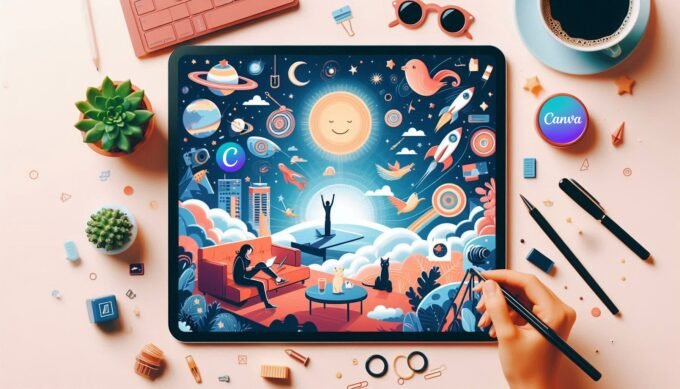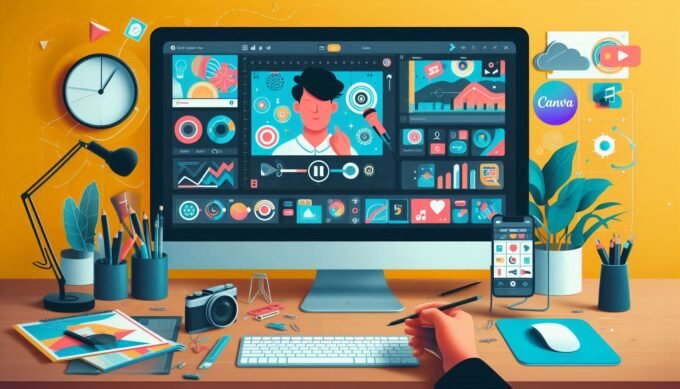Learn how to create Ai avatars in CapCut to add personalized digital characters to your videos—step-by-step and beginner-friendly.
How to Create Ai Avatars in CapCut
When I first explored how to create AI avatars in CapCut, I was genuinely impressed by how easy and creative the process felt. CapCut’s avatar generator allows you to design digital characters—complete with customized appearance, voice, and style—then animate them or use them for voiceovers in your videos. Whether you’re producing explainer content, storytelling clips, or branded animations, knowing how to create AI avatars in CapCut adds a fun and professional dimension to your work.
The tool guides you through avatar customization like selecting face shape, hair, outfits, expressions, and even voice style. You can sync your avatar with your narration or speech using Text‑to‑Speech AI for full animated delivery. Learning how to create AI avatars in CapCut unlocks a playful yet polished way to bring digital characters to life—all without drawing or complex animation software. Let me walk you through it step by step so you can design avatars easily and confidently.
📚 Table of Contents
• 💡 Advantages
• 🧭 Wondering How to Begin?
• ✍️ Effective Prompt Techniques
• 🧷 My Go‑To Prompt Picks
• ⚠️ Common Pitfalls and How to Avoid Them
• ❓ FAQ – How to Create Ai Avatars in CapCut
• 💬 User Experiences
💡 Advantages
What amazed me most when I learned how to create AI avatars in CapCut was how accessible and customizable it felt—even for non-designers. Here’s a quick look at why it became my go-to creative tool:
| 🌟 Advantage | 🧭 How to |
|---|---|
| 🎭 Unique Digital Identity | You can design avatars with personalized appearance and style. |
| 🗣️ Integrated Voice Options | Attach voices or use TTS directly for animated narration. |
| ⏱️ Fast Character Setup | Avatar creation completes in minutes with easy sliders and options. |
| 🤖 Consistent Visual Branding | Use the same avatar across multiple videos for continuity. |
| 🧩 Simple Workflow | CapCut handles animation, voice sync, and editing in one place. |
🧭 Wondering How to Begin?
I admit, at first I was skeptical if an avatar tool inside CapCut could look genuine—and sound expressive. But after testing, it quickly surpassed expectations with solid visuals and smooth voice alignment. Once you try it, the process is intuitive and rewarding. So, if you’re ready to learn how to create AI avatars in CapCut, here’s a creative workflow that will take you from blank slate to animated persona confidently.
1. 🎨 Open Avatar Creation Tool
Open CapCut and locate the AI Avatar section or character creator menu.
This is where you initiate the process of how to create AI avatars in CapCut—you’ll enter the interface with options to build your digital character step by step.
2. 🧍 Design Visual Appearance
Choose face shape, hairstyle, outfit, skin tone, and expression from CapCut’s avatar library.
Design decisions like eye color or clothing style help shape your character’s personality. Spend a little time here customizing visuals that reflect your brand or message when you create AI avatars in CapCut.
3. 🗣️ Select Voice or TTS
Pick an animated voice for your avatar or link Text‑to‑Speech AI narration.
You can input voice lines or script blocks that the avatar will recite. When you create AI avatars in CapCut this way, you combine both visual and audible presentation in one dynamic character.
4. 📝 Upload Script or Text Blocks
Enter your dialogue or narration script into the text-to-speech input field, dividing it into smaller segments for pacing.
This improves sync and emotion during playback, so when you create AI avatars in CapCut, the voice matches expression and timing neatly.
5. ▶️ Preview Animation with Speech
Hit play to see your avatar speak with animated mouth movement and expression aligned to the voice.
Adjust pacing, tone, or text length if needed until animation looks natural. This is the core interactive moment when you fine-tune how to create AI avatars in CapCut.
6. ✂️ Place Avatar in Your Project Timeline
Drop the avatar clip into your video project, placing it alongside visuals, text, or scene footage.
This is where the avatar starts interacting with the broader video content. Learning how to create AI avatars in CapCut means integrating character clips seamlessly into storytelling.
7. 📤 Export Final Video with Animated Avatar
Once satisfied with syncing, voice, and placement, export your final video in high resolution and preferred format.
Now you’ve mastered how to create AI avatars in CapCut—your digital character is ready to engage, narrate, and represent your message visually and audibly.
✍️ Effective Prompt Techniques
Writing targeted scripts or dialogues before starting helps the avatar’s speech feel natural and on point. These prompt ideas assist in crafting expressive vocal content:
1. 🎬 Character Dialogue Prompt
• 📥 Prompt: “Write a friendly and clear introduction script that my avatar can speak.”
• 📤 Output Insight: Creates concise, expressive lines that sync naturally.
• 📝 Sample Output: “Hi there! I’m Ava, your virtual assistant. Let’s explore how CapCut avatars work!”
2. 🧠 Voice Tone Prompt
• 📥 Prompt: “Describe the emotional tone my avatar should use — warm, energetic, and confident.”
• 📤 Output Insight: Clarifies pacing and delivery style for the AI voice.
• 📝 Sample Output: “Speak with a friendly tone, moderate pacing, and a bit of uplift.”
3. 📚 Multi-Language Prompt
• 📥 Prompt: “Write the same voice lines in English and Spanish so I can create bilingual avatar narration.”
• 📤 Output Insight: Enables multilingual avatar usage across audiences.
• 📝 Sample Output: “English: Hello and welcome to my channel. Spanish: Hola y bienvenidos a mi canal.”
🧷 My Go‑To Prompt Picks
These prompts help me prepare scripts so when it’s time to create AI avatars in CapCut, the voice-over is crisp and expressive—and needs minimal adjustment:
1. 🧑🏫 Narration Script Prompt
• 📥 Prompt: “Write a short script for an instructional video that the avatar can narrate.”
• 📤 Output Insight: Breaks narration into digestible lines for natural speech.
• 📝 Sample Output: “Welcome! Today, I’ll show you five simple features in CapCut. Let’s begin.”
2. 🌟 Closing Message Prompt
• 📥 Prompt: “Write a encouraging closing message my avatar can deliver confidently.”
• 📤 Output Insight: Provides polished end-of-video phrasing.
• 📝 Sample Output: “Thanks for watching—give avatar creation a try and let your voice be heard!”
3. ✍️ Tone Specification Prompt
• 📥 Prompt: “Specify how the avatar should sound: reassuring, energized, and clear.”
• 📤 Output Insight: Guides TTS engine toward preferred vocal style.
• 📝 Sample Output: “Deliver each sentence with clarity, warmth, and even enthusiasm.”
⚠️ Common Pitfalls and How to Avoid Them
Even simple avatar tools benefit from mindful setup. Here’s what to watch for when you create AI avatars in CapCut:
| ⚠️ Mistake | 💡 How to Avoid |
|---|---|
| 🗣️ Overly long text blocks | Break your script into shorter sentences for better speech pacing. |
| 😐 Monotone voice style | Choose a voice tone that fits emotion and energy needed in narration. |
| 🔧 Unsynced animation | Always preview the speaking avatar and adjust segments for accuracy. |
| 🎭 Avatar design mismatch | Ensure visual style reflects your message and complements your video theme. |
| 🧩 Outdated version | Update CapCut—avatar tools may be hidden or limited in older versions. |
❓ FAQ – How to Create Ai Avatars in CapCut
🎭 Can I create an avatar without design experience?
• Yes, CapCut’s avatar tool provides templates and simple sliders, making design beginner-friendly.
🗣️ Can I attach AI-generated voice to the avatar?
• Absolutely—you can integrate Text‑to‑Speech narration that syncs with avatar movement.
🌍 Are multiple languages supported?
• Yes, you can input scripts in different languages and generate corresponding voice lines.
✍️ Can I edit avatar speech after generation?
• Yes, you can adjust text, timing, tone, and regenerate speech as needed.
📱 Is avatar creation available on mobile and desktop?
• Yes, CapCut includes avatar tools across platforms when you’re using the latest version.
🎨 Can I reuse an avatar across videos?
• Yes, once saved, your avatar can be reused and customized across multiple projects.
🚀 How long does the avatar creation process take?
• Designing and generating voice animation usually takes just a few minutes.
💬 User Experiences
I created my first avatar in CapCut and loved how it added personality to my tutorials—so fun and easy!
— Mia, Educator
My avatar voice sounded surprisingly natural, and the face animations synced well with speech.
— Samuel, Content Creator
Using CapCut to create AI avatars transformed my videos—characters made things more engaging instantly.
— Lina, Social Media Manager
🌟 Final Thoughts
Once you understand how to create AI avatars in CapCut, adding animated characters becomes not just fun, but creatively powerful. You design, narrate, and animate a digital persona in minutes—without drawing skills or complex software. Your videos gain personality, consistency, and a unique voice. I hope this guide inspires you to try avatar creation and see how your message can come to life in a new, expressive way.
🗣️ What Do You Think?
You’re part of a growing group exploring CapCut’s avatar tools in exciting ways. If you run into design questions, voice syncing issues, or need help crafting expressive scripts, leave a comment below. I’m happy to help you refine your avatar workflow!
📚 Related Guides
• How to Create AI Videos with CapCut
• How to Generate AI Voice in CapCut
• How to Use AI Story Maker in CapCut
• How to Auto-Cut Clips with CapCut AI
📢 About the Author
At AIFixup, our team brings over 5 years of hands-on experience in conceptualizing, developing, and optimizing AI tools. Every piece of content you see on this platform is rooted in real-world expertise and a deep understanding of the AI landscape.
Beyond our public content, we also share exclusive insights and free prompt collections with our subscribers every week. If you’d like to receive these valuable resources directly in your inbox, simply subscribe to our Email Newsletter—you’ll find the sign-up form at the bottom right corner of this page.












Leave a comment